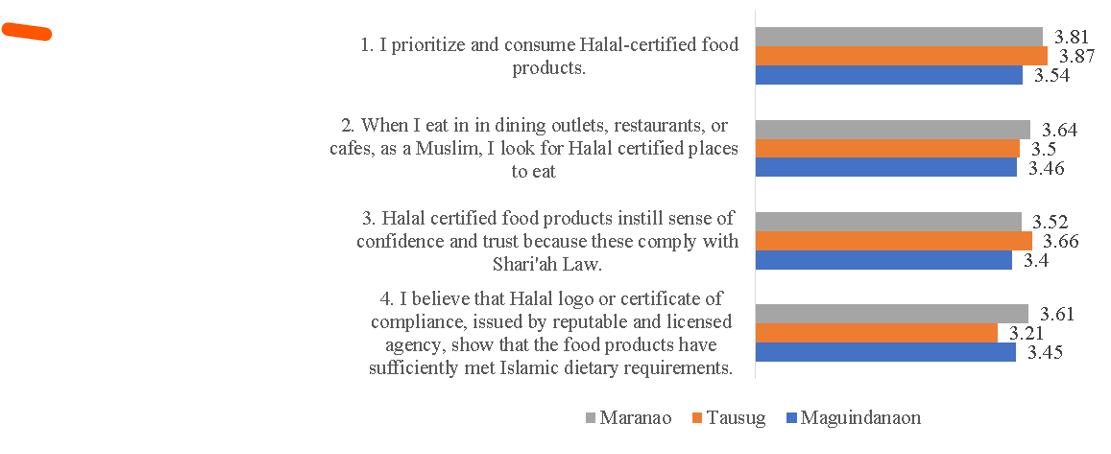Study on Halal Food Consumption, Integrity, Traceability, and Recommendations: Insights from Predominantly Islamized Groups in the Province of Cotabato, Philippines
Main Article Content
Abstract
The study focused on the perspectives on Halal food products of the three predominantly Islamized groups residing in the Cotabato Province, Philippines: Maguindanaon, Tausug, and Maranao. Three hundred heads of households served as the sample of the study. Data was gathered using a self-made survey questionnaire duly validated by Muslim scholars. The research revealed the participants’ strong preference for Halal-Certified products, ensuring adherence to Shari'ah Law. However, the participants’ concerns emerged regarding the lack of standardization and clear responsibility for Halal integrity. Transparency and traceability were identified as essential in the Halal food market, with the participants seeking accurate information and comprehensive traceability systems to prevent cross-contamination. Participants recommend strategic investments in Halal infrastructure, including storage and transportation processes that are crucial in Muslim-dominated regions like the Cotabato Province in the Philippines.
Article Details

This work is licensed under a Creative Commons Attribution-NonCommercial 4.0 International License.
Copyright
Authors who publish their manuscripts in this journal agree to the following terms:
- The copyright of each article remains with the authors.
- Halal Research Journal holds the right to publish the article first under the Creative Commons Attribution 4.0 International License.
- Authors may distribute their published manuscripts non-exclusively (e.g., to institutional repositories or as part of book publications), provided they acknowledge that the article was first published in this journal.
License
Articles published in this journal are licensed under the Creative Commons Attribution 4.0 International License. This license permits anyone to:
- Copy, distribute, adapt, modify, and create derivative works from the material in any form, including for commercial purposes.
- The condition is that proper credit must be given to the authors for the original work.
References
Al-Quran. Surah Al-Baqarah, Chapter II Verse 168
Said, M., Hassan, F., Musa, R., & Rahman, N. A. (2014). "Assessing consumers’ perception, knowledge and religiosity on Malaysia’s halal food products." Procedia Social and Behavioural Sciences, 130, 120–128.
Hadith by Abu Ya'la Shahddad ibn Aus, Muslim
Eid, W. (2018). "Integrating the theory of planned behaviour to identify determinants of halal food consumption in Japan." DOI: 10.1108/ZCP-12-2017-0035
Von Cuevas, S., Franco, C. A., Capistrano, R. C., & Guia, J. (2022, June). Exploring the Potential of Halal Tourism through Institutional Analysis of Halal Certifiers in the Philippines. DOI: 10.21427/73k7-4855.
Liba, R. T., Bernardino, M. S., Real, J., & Viaña, E. (2022, August). Practices and Challenges of Halal Restaurants in Metro Manila. Journal of Tourism Research & Hospitality. DOI: 10.4172/2324-8807.10000986
Salindal, N.A. (2019), "Halal certification compliance and its effects on companies’ innovative and market performance", Journal of Islamic Marketing, Vol. 10 No. 2, pp. 589-605. https://doi.org/10.1108/JIMA-04-2018-0080
Office of Agricultural Affairs, Manila. (2023, August 2). Philippines: Market Brief on Halal Products. Attaché Report (GAIN) No. RP2023-0049. Retrieved from [https://fas.usda.gov/data/philippines-market-brief-halal-products] on Dec. 9, 2023
Izberk-Bilgin, E., & Nakata, C. (2016). Sector-wise Analysis of Global Halal Business. Journal of Islamic Accounting and Business Research, 7(1), 112-128.
Oyelakin, I. O., & Yusuf, A. H. (2018). "Prospects of halal products in developing countries: Comparison between Nigeria and Malaysia." International Journal of Business Society. DOI: 10.18488/journal.70.2018.63.185.199
Amalia, F.A., Sosianika, A. and Suhartanto, D. (2020), “Indonesian millennials’ halal food purchasing:merely a habit?”, British Food Journal, Vol. 122 No. 4, pp. 1185-1198.
Secinaro, S., & Calandra, D. (2020). "Halal food: structured literature review and research agenda." Journal of Agribusiness Marketing. DOI: 10.34101/jam.023.132
Salman, F., & Siddiqui, K. (2011). An exploratory study for measuring consumers' awareness and perceptions towards halal food in Pakistan.
Ali, M. Q., & Ahmad, N. (2023). "The factors that affect halal food and food products awareness and different challenges: An overview." Journal of Agribusiness Marketing.
Pew Research Center. (2014, September 22). Public sees religion's influence waning. Retrieved from https://www.pewresearch.org/politics/2014/09/22/section-1-religion-in-public-life/#religion-in-politics
"Religious Affiliation in the Philippines (2020 Census of Population and Housing) | Philippine Statistics Authority | Republic of the Philippines". psa.gov.ph. Retrieved Dec. 9, 2023.
Laidan, N. H. (2015). "The Development of Halal Tourism Industry in Asia–A Comparative Study". Procedia - Social and Behavioral Sciences, 168, 411-418. doi:10.1016/j.sbspro.2014.10.233
Republic Act No. 7394, 1992
Bashir, A.M., Bayat, A., Olutuase, S.O. and Abdul Latiff, Z.A. (2019), “Factors affecting consumers’intention towards purchasing halal food in South Africa: a structural equation modelling”,Journal of Food Products Marketing, Vol. 25 No. 1, pp. 26-48
Caup, Dialica L. (2023). Cultural Values Expressed in Proverbs of the Meranao People: An Emic Survey. International Journal of Social Science and Humanities Research, 11(2), 359–386. https://doi.org/10.5281/zenodo.8049856
Department of Trade and Industry. (2021). Boosting growth of the Philippine halal industry: A campaign for the government, multi-stakeholders, and the Filipino people.
Naeem, S., Ayyub, R. M., Ishaq, I., Sadiq, S., & Mahmood, T. (2019). "Systematic literature review of halal food consumption - qualitative research era 1990-2017." Journal of Islamic Marketing. DOI: 10.1108/JIMA-01-2019-0001
